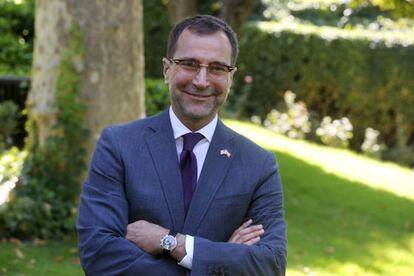“I’m not tracking anti-Americanism; I’m here to build on the relationship”
James Costos is still settling down in Spain but EL PAÍS encounters signs of a switch in style


From the outside, the US Embassy still looks like the same old temple of American power — sitting in the heart of Madrid, protected by the same old beefy security measures, sporting the same metal detectors and guarded by agents who scrutinize visitors as suspiciously as ever.
But a veritable revolution is taking place within its walls: workers are taking measurements on the ground floor, with a view to the new decoration, which is sure to be a difficult match with the crystal chandeliers hanging from the ceiling. The barbecues that Ambassador Solomont used to host on Fridays are also a thing of the past: his successor James Costos is a vegetarian.
Costos, 50, talked to EL PAÍS in his apartment, a move that surprised even his closest aides. There are definitely winds of change at 75 Serrano street, where the new US representative does not conform to the classic ambassadorial profile. And that is why the real news in this appointment lies essentially in his personality and background, which Costos agreed to discuss in the first interview he has granted since he landed in Spain around two weeks ago.
Prior to this position, James Costos — who hails from Lowell, Massachusetts and is of Greek descent — was in charge of global licensing, retail and marketing for cable TV company HBO, a post that makes him particularly sensitive to the realities of a country that is under close US surveillance because of rampant piracy of digital content. But does this mean that tackling piracy has become a new priority for US President Barack Obama?
You need to start by educating people that internet piracy is stealing"
“Not necessarily,” he replies, before adding that it is a problem that the embassy is nevertheless going to focus on. “I would like to work with the government of Spain and figure out how to solve it.”
The problem, he says, is not so much a lack of legislation, which does exist, but a lack of enforcement. So piracy “is one of the priorities, but it’s not the main focus, and I certainly wouldn’t say President Obama sent me here just because of that.”
Costos is well aware that Spain already has a law against illegal downloads and that the government is debating new sanctions — including prison sentences — for websites that link to copyrighted content. But he is thinking along different lines. “It is a matter of education,” he says. “You need to start by educating people about the fact that all that content belongs to someone else. If they’re not educated in the fact that they are stealing from someone, then this will continue to go on. In the US we run an intense awareness campaign, with warnings every time someone is going to download something that’s illegal and explaining the ramifications.
“Perhaps what is needed is a multi-tier strategy: having laws, enforcing them, and educating people about who they’re harming, and understanding what the ramifications are.”
While his sexual orientation will someday stop being an issue worth asking about, Costos, who arrived in Spain with his partner, the decorator Michael Smith, is one of five gay ambassadors appointed (and publicized as such) by Obama.
“I am not an activist,” he explains. “I broadly support human rights for straight, gay, women’s issues. And I just happen to be gay. But an activist? No. I’ve never held a sign and rallied. But I do support it, and I have to say I was activated by the president’s words five or six years ago, when he started to talk about what he wanted to do. [...] He put forward five new ambassadors who are gay; it’s a very strong statement, and I am honored to be one of them. This doesn’t define me as a person, but it is part of who I am. It’s like being a vegetarian: it’s one more facet of James Costos.”
There are five new gay ambassadors; I am honored to be one of them"
And that is precisely what completes an atypical ambassadorial profile. Costos is not just a vegetarian; the most recent US appointee to the land of bullfighting also sits on the board of directors of the Humane Society of the USA, the country’s largest animal-protection group.
“My options are personal,” he says. “But I respect Spanish culture and its traditions, one of which is the corrida, and who am I to give my opinion on the subject? That’s not my role. Just like this embassy will serve all types of food.”
None of this — his HBO background, his sexual orientation or his new profile — were necessarily the key to his appointment. In the US, a determining factor is campaign donations, and his were sizable. But there is no doubt that the result opens up a new era in diplomacy. This means that challenges are addressed from a different perspective and with a different style, as Costos himself will admit.
Asked whether he is aware that Spain registers some of the strongest anti-American sentiment in all of Europe, Costos has the following to say. “Before I left I asked the president for advice — if there was something I should focus on. And one of the things that he said to me was, ‘Go to Spain and tell people in Spain how much we appreciate them.’ I’m not tracking anti-American sentiment — I’m here to develop and build upon a relationship that’s existed for almost 200 years.”
Costos’s main focus right now is on defense and security, without a doubt. Spain has become a key ally in the anti-missile shield at a time when special attention is being paid to North Africa and the Mediterranean; US bases in Spain are in the process of hosting four new destroyers equipped with the Aegis anti-ballistic system (at Rota) and a rapid deployment unit (at Morón).
“My main focus of attention right now is the military. And this is something that the president wanted me to make very clear to Spaniards: they should know how grateful we are for their strategic location and the fact that they are hosting us here.”
Costos traveled to both bases on Tuesday to celebrate the 60th anniversary of the 1953 agreements that marked their creation. “It’s very important to us, especially at this time, with 500 marines stationed here to watch the situation in North Africa and ready to help protect Spanish interests in the region.”
While in Saint Petersburg recently for the G20 summit, Spanish Prime Minister Mariano Rajoy and Obama talked about the possibility of the former visiting the White House in the coming months.
“I think they both want this visit to happen, and I hope it gets scheduled sometime in the future,” says Costos noncommittally, without suggesting any dates.
He would also not make any statements regarding corruption or the secession drive in Catalonia, saying “those are internal issues; they’re not for me to weigh in on,” and citing a lack of time to get familiar with the situation.
On the economic front, Costos says that the reforms put in place by Rajoy seem to be working, and that Spain is at a “positive” moment. President Obama “gave him the high-five when they met recently at the G20, so it feels like a great time for me to be here.” Costos says that he will work in his capacity to help create jobs in Spain by encouraging US businesses to open up here. “Anything that will create jobs on both sides. We also have unemployment in the United States. This is an issue that we all feel... I can feel the pain.”
Tu suscripción se está usando en otro dispositivo
¿Quieres añadir otro usuario a tu suscripción?
Si continúas leyendo en este dispositivo, no se podrá leer en el otro.
FlechaTu suscripción se está usando en otro dispositivo y solo puedes acceder a EL PAÍS desde un dispositivo a la vez.
Si quieres compartir tu cuenta, cambia tu suscripción a la modalidad Premium, así podrás añadir otro usuario. Cada uno accederá con su propia cuenta de email, lo que os permitirá personalizar vuestra experiencia en EL PAÍS.
¿Tienes una suscripción de empresa? Accede aquí para contratar más cuentas.
En el caso de no saber quién está usando tu cuenta, te recomendamos cambiar tu contraseña aquí.
Si decides continuar compartiendo tu cuenta, este mensaje se mostrará en tu dispositivo y en el de la otra persona que está usando tu cuenta de forma indefinida, afectando a tu experiencia de lectura. Puedes consultar aquí los términos y condiciones de la suscripción digital.








































